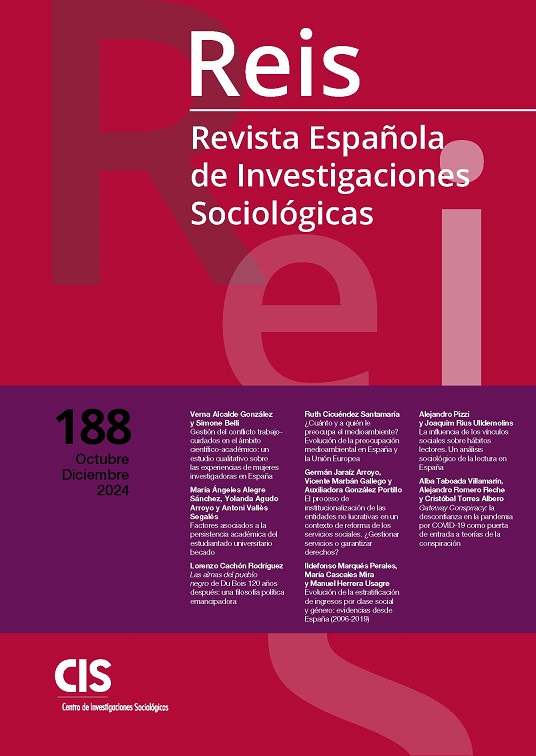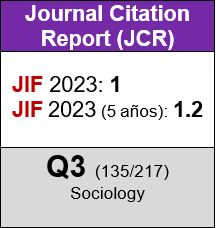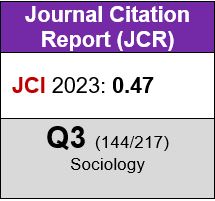Gestión del conflicto trabajo-cuidados en el ámbito científico-académico: un estudio cualitativo sobre las experiencias de mujeres investigadoras en España
DOI:
https://doi.org/10.5477/cis/reis.188.3-20Palabras clave:
Academia, Ciencia, Cuidados, Desigualdad de género, Investigación, Madre, Maternidad, TrabajoResumen
En este artículo analizamos las experiencias de maternidad y cuidados de mujeres investigadoras en España con el fin de comprender el modo en que gestionan el conflicto trabajo-cuidados en el ámbito científico-académico y caracterizar sus implicaciones laborales y psicosociales. Para ello, realizamos 30 entrevistas semiestructuradas a investigadoras de todos los niveles de la carrera académica adscritas a 23 centros de investigación y/o universidades españolas. Los resultados muestran que las madres académicas experimentan sobrecarga, estrés y culpabilidad ante el doble mandato de ser «buenas madres» y «buenas profesionales». También indican que se ven forzadas a sacrificar el cuidado de sí mismas para atender más holgadamente sus responsabilidades profesionales y domésticas, y a elegir entre dos males menores: postergar/renunciar a la maternidad o rebajar sus ambiciones profesionales.
Descargas
Citas
Alonso-Álvarez, Alba; Diz-Otero, Isabel y Lois, Marta (2016). «Is Gender Mainstreaming Helping Women Scientists? Evidences from Research Policies in Spain». Investigaciones Feministas, 7(2): 273-291. doi: 10.5209/INFE.52963 DOI: https://doi.org/10.5209/INFE.52963
Alonso-Álvarez, Alba y Diz-Otero, Isabel (2022). «¿Nadando contra corriente? Resistencias a la promoción de la conciliación en las universidades españolas». Revista Internacional de Sociología, 80(2), e208-e208. doi: 10.3989/ris.2022.80.2.21.01 DOI: https://doi.org/10.3989/ris.2022.80.2.21.01
Armenti, Carmen (2004). «May Babies and Posttenure Babies: Maternal Decisions of Women Professors». The Review of Higher Education, 27(2): 211-231. doi: 10.1353/rhe.2003.0046 DOI: https://doi.org/10.1353/rhe.2003.0046
Benschop, Yvonne y Brouns, Margo (2003). «Crumbling Ivory Towers: Academic Organizing and Its Gender Effects». Gender, Work and Organization, 10(2): 194-212. doi: 10.1111/1468-0432.t01-1-00011 DOI: https://doi.org/10.1111/1468-0432.t01-1-00011
Castaño-Collado, Cecilia; Vázquez-Cupeiro, Susana y Martínez-Cantos, José L. (2019). «Gendered Management in Spanish Universities: Functional Segregation among Vice-rectors». Gender and Education, 31(8): 966-985. doi: 10.1080/09540253.2017.1410109 DOI: https://doi.org/10.1080/09540253.2017.1410109
Castaño-Collado, Cecilia y Vázquez-Cupeiro, Susana (2023). «Resistance and Counter-resistance to Gender Equality Policies in Spanish Universities». Papers. Revista de Sociologia, 108(2), e3105-e3105. doi: 10.5565/rev/papers.3105 DOI: https://doi.org/10.5565/rev/papers.3105
Ceci, Stephen J.; Ginther, Donna K.; Kahn, Shulamit y Williams, Wendy M. (2014). «Women in Academic Science: A Changing Landscape». Psychological Science in the Public Interest, 15(3): 75-141. doi: 10.1177/1529100614541236 DOI: https://doi.org/10.1177/1529100614541236
Cech, Erin A. y Blair-Loy, Mary (2019). «The Changing Career Trajectories of New Parents in STEM». Proceedings of the National Academy of Sciences, 116(10): 4182-4187. doi: 10.1073/pnas.1810862116 DOI: https://doi.org/10.1073/pnas.1810862116
Comisión Europea (2021). She Figures 2021. Gender in Research and Innovation: Statistics and Indicators. Publications Office of the European Union. doi: 10.2777/06090
Conesa-Carpintero, Ester y González-Ramos, Ana M. (2018a). «Accelerated Researchers: Psychosocial Risks in Gendered Institutions in Academia». Frontiers in Psychology, 9. doi: 10.3389/fpsyg.2018.01077 DOI: https://doi.org/10.3389/fpsyg.2018.01077
Conesa-Carpintero, Ester y González-Ramos, Ana M. (2018b). «Neo-gerencialismo y austeridad en el contexto académico español y europeo. ¿Dos caras de la misma moneda?». Política y Sociedad, 55(1): 257-282. doi: 10.5209/POSO.55883 DOI: https://doi.org/10.5209/POSO.55883
European Institute for Gender Equality (2020). Gender Equality Index 2020. Key Findings for the EU. Publications Office of the European Union.
Fothergill, Alice y Feltey, Kathryn (2003). «“I’ve Worked Very Hard and Slept Very Little”: Mothers on Tenure Track in Academia». Journal of the Motherhood Initiative for Research and Community Involvement, 5(2).
Gabriel, Allison S.; Allen, Tammy D.; Devers, Cynthia E.; Eby, Lillian T.; Gilson, Lucy L.; Hebl, Mikki; Kehoe, Rebecca R.; King, Eden B.; Ladge, Jamie J.; Little, Laura M.; Ou, Amy Y.; Schleicher, Deidra J.; Shockley, Kristen M.; Klotz, Anthony C. y Rosen, Christopher C. (2023). «A Call to Action: Taking the Untenable Out of Women Professors’ Pregnancy, Postpartum, and Caregiving Demands». Industrial and Organizational Psychology, 16(2): 187-210. doi: 10.1017/iop.2022.111 DOI: https://doi.org/10.1017/iop.2022.111
Gallardo, Marta (2021). «Does Maternity Affect Women’s Careers? Perceptions of Working Mothers in Academia». Educación XX1, 24(1). doi: 10.5944/educxx1.26714 DOI: https://doi.org/10.5944/educxx1.26714
González-Orta, Lydia (2015). Las mujeres en los premios científicos en España 2009-2014. Madrid: Ministerio de Economía y Competitividad.
González-Ramos, Ana M.; Conesa-Carpintero, Ester; Pons-Peregort, Olga y Tura-Solvas, Marta (2020). «The Spanish Equality Law and the Gender Balance in the Evaluation Committees: An Opportunity for Women’s Promotion in Higher Education». Higher Education Policy, 33(4): 815-833. doi: 10.1057/s41307-018-0103-y DOI: https://doi.org/10.1057/s41307-018-0103-y
Habicht, Isabel M. (2022). «Do Mothers Get Lost at the Postdoc Stage? Event History Analysis of Psychologists at German Universities (1980-2019)». Higher Education. doi: 10.1007/s10734-022-00949-y DOI: https://doi.org/10.1007/s10734-022-00949-y
Hunter, Laura A. y Leahey, Erin (2010). «Parenting and Research Productivity: New Evidence and Methods». Social Studies of Science, 40(3): 433-451. doi: 10.1177/0306312709358472 DOI: https://doi.org/10.1177/0306312709358472
Huppatz, Kate; Sang, Kate y Napier, Jemina (2019). «‘If You Put Pressure on Yourself to Produce Then That’s Your Responsibility’: Mothers’ Experiences of Maternity Leave and Flexible Work in the Neoliberal University». Gender, Work & Organization, 26(6): 772-788. doi: 10.1111/gwao.12314 DOI: https://doi.org/10.1111/gwao.12314
Huyer, Sophia (2015). Is the Gender Gap Narrowing in Science and Engineering?. En: UNESCO Science Report: Towards 2030 (pp. 85-103). Paris: UNESCO.
Íñiguez-Rueda, Lupicinio (2003). El análisis del discurso en las ciencias sociales: Variedades, tradiciones y práctica. En: L. Íñiguez Rueda (ed.). Análisis del discurso. Manual para las ciencias sociales (pp. 83-124). Barcelona: Universitat Oberta Catalunya.
Joecks, Jasmin; Pull, Kerstin y Backes-Gellner, Uschi (2014). «Childbearing and (Female) Research Productivity: A Personnel Economics Perspective on the Leaky Pipeline». Journal of Business Economics, 84(4): 517-530. doi: 10.1007/s11573-013-0676-2 DOI: https://doi.org/10.1007/s11573-013-0676-2
Jolly, Shruti; Griffith, Kent A.; DeCastro, Rochelle; Stewart, Abigail; Ubel, Peter y Jagsi, Reshma (2014). «Gender Differences in Time Spent on Parenting and Domestic Responsibilities by High-achieving Young Physician-researchers». Annals of Internal Medicine, 160(5): 344-353. doi: 10.7326/M13-0974 DOI: https://doi.org/10.7326/M13-0974
Krapf, Matthias; Ursprung, Heinrich W. y Zimmermann, Christian (2017). «Parenthood and Productivity of Highly Skilled Labor: Evidence from the Groves of Academe». Journal of Economic Behavior & Organization, 140: 147-175. doi: 10.1016/j.jebo.2017.05.010 DOI: https://doi.org/10.1016/j.jebo.2017.05.010
Lara, Catalina (2007). «La perspectiva de género en los sistemas de evaluación de la producción científica». Revista de Investigación Educativa, 25(1): 133-148.
López-Díaz, Ana J. y Pereira, María D. (2021). «Transferencia del conocimiento: ¿una cuestión de género?». Ciencia, Técnica y Mainstreaming Social, 5. DOI: https://doi.org/10.4995/citecma.2021.14261
Lutter, Mark y Schröder, Martin (2020). «Is There a Motherhood Penalty in Academia? The Gendered Effect of Children on Academic Publications in German Sociology». European Sociological Review, 36(3): 442-459. doi: 10.1093/esr/jcz063 DOI: https://doi.org/10.1093/esr/jcz063
Lutter, Mark; Habicht, Isabel M. y Schröder, Martin (2022). «Gender Differences in the Determinants of Becoming a Professor in Germany. An Event History Analysis of Academic Psychologists from 1980 to 2019». Research Policy, 51(6): 104506. doi: 10.1016/j.respol.2022.104506 DOI: https://doi.org/10.1016/j.respol.2022.104506
Lynn, Christopher D.; Howells, Michaela E. y Stein, Max J. (2018). «Family and the Field: Expectations of a Field-based Research Career Affect Researcher Family Planning Decisions». PLoS ONE, 13(9): e0203500. doi: 10.1371/journal.pone.0203500 DOI: https://doi.org/10.1371/journal.pone.0203500
Mason, Mary A.; Wolfinger, Nicholas H. y Goulden, Marc (2013). Do Babies Matter?: Gender and Family in the Ivory Tower. En: Do Babies Matter?. New Jersey: Rutgers University Press. doi: 10.36019/9780813560823 DOI: https://doi.org/10.36019/9780813560823
Minnotte, Krista L. (2021). «Academic Parenthood: Navigating Structure and Culture in an Elite Occupation». Sociology Compass, 15(7): e12903. doi: 10.1111/soc4.12903 DOI: https://doi.org/10.1111/soc4.12903
Montes-López, Estrella (2017). «La ausencia de corresponsabilidad, freno para el desarrollo de la carrera laboral femenina en la Academia». Feminismo/s, 29, Article 29. doi: 10.14198/fem.2017.29.09 DOI: https://doi.org/10.14198/fem.2017.29.09
Montes-López, Estrella y Gallego-Morón, Nazareth (2017). «La segregación ocupacional del profesorado femenino en la universidad española». REencuentro. Análisis de Problemas Universitarios, 28(74): 214-236.
Montes-López, Estrella y Rasskin-Gutman, Irina (2019). Los retos de la conciliación de la vida personal, familiar y laboral percibidos por profesorado femenino de universidades españolas. En: L. I. Castañeda-Rentería; K. A. Contreras-Tinoco y M. F. Parga-Jiménez (eds.). Mujeres en las universidades iberoamericanas: la búsqueda de la necesaria conciliación trabajo-familia (pp. 247-268). Guadalajara, Jalisco: Universidad de Guadalajara (México).
Morgan, Allison C.; Way, Samuel F.; Hoefer, Michael J. D.; Larremore, Daniel B.; Galesic, Mirta y Clauset, Aaron (2021). «The Unequal Impact of Parenthood in Academia». Science Advances, 7(9): eabd1996. doi: 10.1126/sciadv.abd1996 DOI: https://doi.org/10.1126/sciadv.abd1996
Myers, Kyle R.; Tham, Wei Y.; Yin, Yian.; Cohodes, Nina; Thursby, Jerry G.; Thursby, Marie C.; Schiffer, Peter; Walsh, Joseph T.; Lakhani, Karim R. y Wang, Dashun (2020). «Unequal Effects of the COVID-19 Pandemic on Scientists». Nature Human Behaviour, 4(9). doi: 10.1038/s41562-020-0921-y DOI: https://doi.org/10.1038/s41562-020-0921-y
Nikunen, Minna (2012). «Changing University Work, Freedom, Flexibility and Family». Studies in Higher Education, 37(6): 713-729. doi: 10.1080/03075079.2010.542453 DOI: https://doi.org/10.1080/03075079.2010.542453
Pastor-Gosálbez, Inma; Pontón, Paloma; Belzunegui, Ángel y Acosta, Ana (2015). Gender Policies in Spanish Universities: From Regulation to Equality Plans. En: H. D. Syna y C.-E. Costea (eds.). Women’s Voices in Management: Identifying Innovative and Responsible Solutions (pp. 34-51). Basingstoke, Hampshire: Palgrave Macmillan UK. doi: 10.1057/9781137432155_3 DOI: https://doi.org/10.1057/9781137432155_3
Pastor-Gosálbez, Inma y Acosta-Sarmiento, Ana (2016). «La institucionalización de las políticas de igualdad de género en la Universidad española. Avances y retos». Investigaciones Feministas, 7(2): 247-271. doi: 10.5209/INFE.52966 DOI: https://doi.org/10.5209/INFE.52966
Pastor-Gosálbez, Inma; Acosta-Sarmiento, Ana; Torres-Coronas, Teresa y Calvo-Merino, Marta (2020). «Los planes de igualdad en las universidades españolas. Situación actual y retos de futuro». Educación XX1, 23(1). doi: 10.5944/educxx1.23873 DOI: https://doi.org/10.5944/educxx1.23873
Reuben, Ernesto; Sapienza, Paola y Zingales, Luigi (2014). «How Stereotypes Impair Women’s Careers in Science». Proceedings of the National Academy of Sciences, 111(12): 4403-4408. doi: 10.1073/pnas.1314788111 DOI: https://doi.org/10.1073/pnas.1314788111
Rhoads, Steven E. y Rhoads, Christopher H. (2012). «Gender Roles and Infant/toddler Care: Male and Female Professors on the Tenure Track». Journal of Social, Evolutionary, and Cultural Psychology, 6(1): 13-31. doi: 10.1037/h0099227 DOI: https://doi.org/10.1037/h0099227
Schröder, Martin; Lutter, Mark y Habicht, Isabel M. (2021). «Publishing, Signaling, Social Capital, and Gender: Determinants of Becoming a Tenured Professor in German Political Science». PLOS ONE, 16(1): e0243514. doi: 10.1371/journal.pone.0243514 DOI: https://doi.org/10.1371/journal.pone.0243514
Segarra-Saavedra, Jesús; Tur-Viñes, Victoria e Hidalgo-Marí, Tatiana (2020). «Género y perfil en las autorías y colaboraciones de Revista Mediterránea de Comunicación (2010-2019)». index.comunicación, 10(1): 149-172. doi: 10.33732/ixc/10/01Genero DOI: https://doi.org/10.33732/ixc/10/01Genero
Settles, Isis H.; Cortina, Lilia M.; Malley, Janet y Stewart, Abigail J. (2006). «The Climate for Women in Academic Science: The Good, the Bad, and the Changeable». Psychology of Women Quarterly, 30(1): 47-58. doi: 10.1111/j.1471-6402.2006.00261.x DOI: https://doi.org/10.1111/j.1471-6402.2006.00261.x
Shauman, Kimberlee; Howell, Lydia P.; Paterniti, Debora A.; Beckett, Laurel A. y Villablanca, Amparo C. (2018). «Barriers to Career Flexibility in Academic Medicine: A Qualitative Analysis of Reasons for the Underutilization of Family-friendly Policies, and Implications for Institutional Change and Department Chair Leadership». Academic Medicine, 93(2): 246. doi: 10.1097/ACM.0000000000001877 DOI: https://doi.org/10.1097/ACM.0000000000001877
Sieverding, Monika; Eib, Constanze; Neubauer, Andreas B. y Stahl, Thomas (2018). «Can Lifestyle Preferences Help Explain the Persistent Gender Gap in Academia? The “Mothers Work Less” Hypothesis Supported for German But Not for U.S. Early Career Researchers». PLOS ONE, 13(8): e0202728. doi: 10.1371/journal.pone.0202728 DOI: https://doi.org/10.1371/journal.pone.0202728
Society of Spanish Researchers in the United Kingdom (2018). Percepciones que crean barreras. Igualdad de género en la investigación científica.
Tildesley, Rebecca; Lombardo, Emanuela y Verge, Tània (2022). «Power Struggles in the Implementation of Gender Equality Policies: The Politics of Resistance and Counter-Resistance in Universities». Politics & Gender, 18(4): 879-910. doi: 10.1017/S1743923X21000167 DOI: https://doi.org/10.1017/S1743923X21000167
Tomàs-Folch, Marina T. y Mentado-Labao, Trinidad (2013). «Las temáticas y preocupaciones de las investigadoras élite en Ciencias Sociales de las universidades catalanas». Arbor, 189(760): a019-a019. doi: 10.3989/arbor.2013.760n2005 DOI: https://doi.org/10.3989/arbor.2013.760n2005
Unidad de Mujeres y Ciencia (2023). Científicas en cifras 2023. Madrid: Ministerio de Ciencia e Innovación.
Verge, Tània (2021). «Gender Equality Policy and Universities: Feminist Strategic Alliances to Re-gender the Curriculum». Journal of Women, Politics & Policy, 42(3): 191-206. doi: 10.1080/1554477X.2021.1904763 DOI: https://doi.org/10.1080/1554477X.2021.1904763
Verge, Tània; Ferrer-Fons, Mariona y González, María J. (2018). «Resistance to Mainstreaming Gender into the Higher Education Curriculum». European Journal of Women’s Studies, 25(1): 86-101. doi: 10.1177/1350506816688237 DOI: https://doi.org/10.1177/1350506816688237
Ysseldyk, Renate; Greenaway, Katharine H.; Hassinger, Elena; Zutrauen, Sarah; Lintz, Sarah; Bhatia, Maya P.; Frye, Margaret; Starkenburg, Else y Tai, Vera (2019). «A Leak in the Academic Pipeline: Identity and Health among Postdoctoral Women». Frontiers in Psychology, 10. doi: 10.3389/fpsyg.2019.01297 DOI: https://doi.org/10.3389/fpsyg.2019.01297
Descargas
Publicado
Cómo citar
Número
Sección
Licencia
Derechos de autor 2024 Revista Española de Investigaciones Sociológicas

Esta obra está bajo una licencia internacional Creative Commons Atribución-CompartirIgual 4.0.
Permite Compartir — copiar y redistribuir el material en cualquier medio o formato, Adaptar — remezclar, transformar y construir a partir del material para cualquier propósito, incluso comercialmente.








